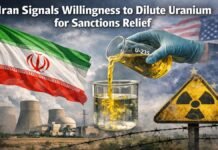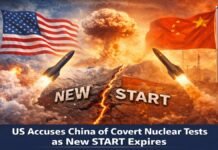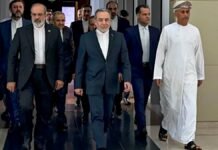
Key Points:
- Summit Cancelled: US President Donald Trump announced he has cancelled his proposed meeting with Russian President Vladimir Putin in Budapest, Hungary, citing a lack of diplomatic progress.
- Reason: Trump expressed frustration that his conversations with Putin “don’t go anywhere,” stating he didn’t want a “wasted meeting.”
- New Sanctions: Hours after the cancellation, the US Treasury Department imposed sweeping sanctions on Russia’s two largest oil companies, Rosneft and Lukoil, and their subsidiaries.
- Goal of Sanctions: The sanctions are intended to cut off key revenues funding Russia’s war effort in Ukraine and pressure Moscow into accepting an immediate ceasefire.
- Diplomatic Standoff: The pause follows Russia’s firm rejection of Trump’s latest ceasefire proposal, which called for a freeze along the current front lines.
Washington D.C.: Speculation regarding a high-stakes meeting between US President Donald Trump and Russian President Vladimir Putin in Budapest has abruptly ended. President Trump confirmed on Wednesday (October 22, 2025) at the White House that he had cancelled the proposed summit, expressing clear frustration over the lack of progress in negotiations to end the ongoing war in Ukraine.
“We canceled the meeting with President Putin. It didn’t feel right to me. It didn’t feel like we were going to get to the place we have to get, so I canceled it,” Trump told the media, later adding, “Every time I speak with Vladimir, I have good conversations, and then they don’t go anywhere. They just don’t go anywhere.”
The decision to put the summit on hold followed a preparatory call between US Secretary of State Marco Rubio and Russian Foreign Minister Sergei Lavrov on Monday, which reportedly highlighted insurmountable differences. While Trump had proposed freezing the conflict at the current battle lines, a proposal Ukrainian President Volodymyr Zelenskyy later called a “good compromise,” Moscow staunchly rejected the immediate ceasefire idea. Russian officials insisted that any peace talks must address the “root causes of the conflict,” including Kyiv’s non-aligned status and its eastern territorial claims.
Hammering the War Chest: New Sanctions Target Russian Oil
In a dramatic policy escalation, the Trump administration followed the summit cancellation by announcing the first major sanctions against Russia in his second term. The US Department of the Treasury’s Office of Foreign Assets Control (OFAC) imposed sweeping measures targeting Rosneft and Lukoil, Russia’s two largest oil companies, along with over 30 of their subsidiaries.
Treasury Secretary Scott Bessent emphasized that the move was necessary “given President Putin’s refusal to end this senseless war.” These “tremendous sanctions” are strategically designed to degrade Russia’s ability to fund its military operations by cutting off key oil revenues, the lifeblood of the Kremlin’s war machine.
The action marks a significant shift in the Trump administration’s approach, which had previously relied more on tariffs (such as those levied against nations buying discounted Russian oil) than direct financial sanctions.
A Shifting Stance on Ukraine Peace
The cancelled meeting marks the latest twist in President Trump’s efforts to broker peace. Just last week, after a two-and-a-half-hour phone call with Putin, Trump suggested “significant progress” had been made and touted the Budapest meeting. This was followed by a highly scrutinized meeting with Ukrainian President Zelenskyy, where Trump reportedly pushed the idea of Ukraine ceding occupied territory, a stance Kyiv firmly rejects.
The US President’s frustration appears tied to his unfulfilled promise to stop the Russia-Ukraine war swiftly upon assuming office in January 2025. Now, with sanctions deployed and the meeting postponed, diplomatic pressure is ratcheted up, with the White House urging allies to adhere to the new sanctions to push Moscow to the negotiating table.




















































